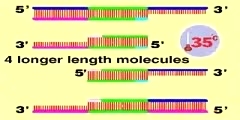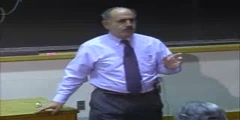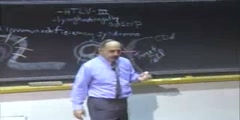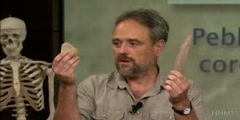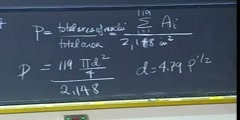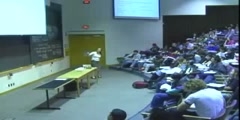Lec 11 - New Modes and Orders: Machiavelli's The Prince (chaps. 13-26)
"Lec 11 - New Modes and Orders: Machiavelli's The Prince (chaps. 13-26)" Introduction to Political Philosophy (PLSC 114) The discussion of Machiavelli's politics continues in the context of his most famous work, The Prince. A reformer of the moral Christian and classical concepts of goodness and evil, Machiavelli proposes his own definitions of virtue and vice, replacing the vocabulary associated with Plato and the biblical sources. He relates virtue, or virtu, to manliness, force, ambition and the desire to achieve success at all costs. Fortune, or fortuna, is a woman, that must be conquered through policies of force, brutality, and audacity. The problem of "dirty hands" in political and philosophical literature is discussed in detail. 00:00 - Chapter 1. Introduction and Class Agenda 04:09 - Chapter 2. "Discourses on Livy" 10:30 - Chapter 3. The Problem of "Dirty Hands" 22:50 - Chapter 4. Was Machiavelli a Machiavellian? 36:19 - Chapter 5. What Did Machiavelli Achieve? Complete course materials are available at the Open Yale Courses website: http://open.yale.edu/courses This course was recorded in Fall 2006.
Video is embedded from external source so embedding is not available.
Video is embedded from external source so download is not available.
Channels: Others
Tags: Ambizione Discourses Livy prince Spinoza Mandragola umori virtù
Uploaded by: yalepolphi ( Send Message ) on 28-08-2012.
Duration: 43m 29s
Here is the next lecture for this course
Lec 10 - New Modes and Orders: Machiavel ...
37:21 | 2786 viewsLec 13 - The Prince and the Palace: Human ...
01:13:47 | 2621 viewsNaked archaeologist preview - Jerusalem & ...
00:33 | 7885 viewsProblems with Darwinian theory of Evoluti ...
00:00 | 2771 viewsLec 8 - Computer Science 61A - orders of ...
52:49 | 2195 viewsBaltimore Radon Mitigation (410) 381-1557 ...
01:02 | 17659 viewsLec 15 - Constitutional Government: Locke ...
44:41 | 3188 viewsPCR - polymerase chain reaction
10:14 | 55129 viewsThe polymerase chain reaction (PCR)
04:37 | 67923 viewsVirology/Tumor Viruses Lecture MIT
50:21 | 17363 viewsLecture on AIDS
50:03 | 13556 viewsClassification of Stone Tools
03:04 | 5039 viewsChemical Science - Discovery of Nucleus - ...
35:15 | 21060 viewsChemical Science - Matter As a Wave - Lec ...
44:24 | 13867 viewsChemical Science - Kinetics (cont.) - Le ...
42:47 | 8694 viewsNo content is added to this lecture.
This video is a part of a lecture series from of Yale
Lecture list for this course
Lec 1 - Introduction: What is Political Philosophy?
Lec 2 - Socratic Citizenship: Plato's Apology
Lec 3 - Socratic Citizenship: Plato's Crito
Lec 4 - Philosophers and Kings: Plato's Republic, I-II
Lec 5 - Philosophers and Kings: Plato's Republic, III-IV
Lec 6 - Philosophers and Kings: Plato's Republic, V
Lec 7 - The Mixed Regime and the Rule of Law: Aristotle's Politics, I, III
Lec 8 - The Mixed Regime and the Rule of Law: Aristotle's Politics, IV
Lec 9 - The Mixed Regime and the Rule of Law: Aristotle's Politics, VII
Lec 10 - New Modes and Orders: Machiavelli's The Prince (chaps. 1-12)
Lec 12 - The Sovereign State: Hobbes' Leviathan
Lec 13 - The Sovereign State: Hobbes' Leviathan
Lec 14 - The Sovereign State: Hobbes' Leviathan
Lec 15 - Constitutional Government: Locke's Second Treatise (1-5)
Lec 16 - Constitutional Government: Locke's Second Treatise (7-12)
Lec 17 - Constitutional Government: Locke's Second Treatise (13-19)
Lec 18 - Democracy and Participation: Rousseau's Discourse
Lec 19 - Democracy and Participation: Rousseau's Discourse
Lec 20 - Democracy and Participation: Rousseau's Social Contract, I-II
Lec 21 - Democratic Statecraft: Tocqueville's Democracy in America
Lec 22 - Democratic Statecraft: Tocqueville's Democracy in America
Lec 23 - Democratic Statecraft: Tocqueville's Democracy in America









